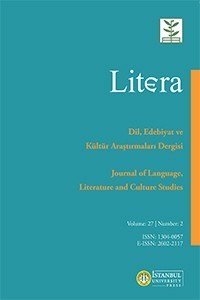Commensality and Togetherness in Becky Chambers’ The Long Way to a Small, Angry Planet
Commensality and Togetherness in Becky Chambers’ The Long Way to a Small, Angry Planet
Food in literature is always part of a symbolic act, as the characters within do not eat to stay alive as humans do, but rather, this depiction of eating is always a symbolic process. Food, especially in science fiction and fantasy fiction, works on an even grander scale by being an integral part of the world-building process. It operates on a two-fold scale by serving as a familiar anchor in futuristic and fantastical settings, while also functioning as a defamiliarizing agent that adds to the strangeness of the story world. Food is an incredibly complex motif to be explored in literature, but what will be concentrated on here is the aspect of commensality that is related to food and food practices. Commensality, often seen as related to conviviality, is the practice of sharing a table and consuming food together. This practice has connotations of the deeper meanings vested within food practices in a communal and social sense. These practices promote harmony and feelings of belongingness and togetherness. This paper looks at The Long Way to a Small, Angry Planet (2015) by Becky Chambers through the lens of food to explore how commensality works to create a home and promote the feeling of togetherness amongst an inter-galactic space crew that consists of multiple alien species from radically different cultures and communities.
Keywords:
Commensality, community, food, family science fiction,
___
- Barthes, R. (2013). Toward a psychosociology of contemporary food consumption. In C. Counihan & P. V. Esterik (Eds.), Food and culture: A reader (3rd ed., pp. 23-30). New York, NY: Routledge. (Original work published 1961). google scholar
- Brillat-Savarin, J. A. (2009). The physiology of taste: Or mediations on transcendental gastronomy (M.F.K. Fisher, Trans.). New York, NY: Everyman’s Library. (Original work published 1825). google scholar
- Chambers, B. (2015). The long way to a small, angry planet. London, UK: Hodder & Stoughton. google scholar
- Douglas, M. (1972). Deciphering a meal. Daedalus, 101(1), 61-82. Retrieved from https://www.jstor.org/ stable/20024058. google scholar
- Douglas, M. (1984a). Food in the social order: Studies of food and festivities in three American communities. New York, NY: Russell Sage Foundation. google scholar
- Douglas, M. (1984b). Purity and danger: An analysis of the concepts of pollution and taboo. London, UK: Routledge. (Original work published 1966). google scholar
- Fischler, C. (1988). Food, self and identity. Social Science Information, 27, 275-293. https://doi. org/10.1177/053901888027002005. google scholar
- Fischler, C. (2011). Commensality, society and culture. Social Science Information, 50(3-4), 528-548. https://doi. org/10.1177/0539018411413963. google scholar
- Forster, L. (2004). Futuristic foodways: The metaphorical meaning of food in science fiction film. In A. L. Bower (Ed.), Reel food: Essays on food and film (pp. 251-266). New York, NY: Routledge. google scholar
- Goldstein, D. B. (2018). Commensality. In G.G. Shahani, Food and literature (pp. 39-58). New York, NY: Cambridge University Press. google scholar
- Grignon, C. (2001). Commensality and social morphology: An essay of typology. In P. Scholliers (Ed.), Food, drink and identity: Cooking, eating and drinking in Europe since the middle ages (pp. 23- 33). Oxford, UK: Berg. google scholar
- Kerner, S. & Chou, C. (2015). Introduction. In S. Kerner, C. Chou, & M. Warmind (Eds.), Commensality: From everyday food to feast (pp. 1-10). London, UK: Bloomsbury Academic. google scholar
- Lévi-Strauss, C. (2013). The Culinary Triangle. In C. Counihan & P. V. Esterik (Eds.), Food and culture: A reader (3rd ed., pp. 40-47). New York, NY: Routledge. (Original work published 1966). google scholar
- Lupton, D. (1994). Food, memory and meaning: The symbolic and social nature of food events. The Sociological Review, 42(4), 664-685. https://doi.org/10.1111/j.1467-954X.1994.tb00105.x. google scholar
- Nicholson, M. (1987). Food and power: Homer, Carroll, Atwood and others. Mosaic: An Interdisciplinary Critical Journal, 20(3), 37-55. Retrieved from https://www.jstor.org/stable/24778824. google scholar
- Retzinger, J. P. (2008). Speculative visions and imaginary meals: Food and the environment in (post-apocalyptic) science fiction films. Cultural Studies, 22(3-4), 369-390. https://doi.org/10.1080/09502380802012500. google scholar
- Roberts, A. (2000) Science Fiction. London, UK: Routledge. google scholar
- Rosenblum, J. (2010). Food and identity in Early Rabbinic Judaism. Cambridge, UK: Cambridge University Press. google scholar
- Seed, D. (1999) American science fiction and the cold war: Literature and film. Edinburgh, UK: Fitzroy Dearborn. google scholar
- Slusser, G. (1996). Of Foods, gods, and men: The theory and practice of science fictional eating. In G. Westfahl, G. google scholar
- Slusser, & E.S. Rabkin (Eds.), Foods of the gods: Eating and the eaten in fantasy and science fiction (pp. 1-19). Athens, GA: The University of Georgia Press. google scholar
- Başlangıç: 1954
- Yayıncı: İstanbul Üniversitesi
Sayıdaki Diğer Makaleler
Aiding and Abetting Survival: Americanizing Robinson Crusoe through Adaptation
Whatever Singularity in de Bernières’ Captain Corelli’s Mandolin
Commensality and Togetherness in Becky Chambers’ The Long Way to a Small, Angry Planet
Peter Shaffer’s Equus and Equine-assisted Psychotherapy (EAP)
Fethiye KABATAŞ KESKİN, Ebru YENER GÖKŞENLİ
The Landscape of Middle English Focusing on the Adverb Even
Kurgusal Eserlerde Otizm Ve Buzdolabı Anne Teorisi: Pauline Holdstock’ın Here I Am! Adlı Romanı
“Paracelsus’un Gülü” Öyküsünün İmgelem Kuramı Açısından Yorumlanması
Homines Sacri of Eskibahçe: An Agambenian Reading of Louis de Bernières’ Birds without Wings
